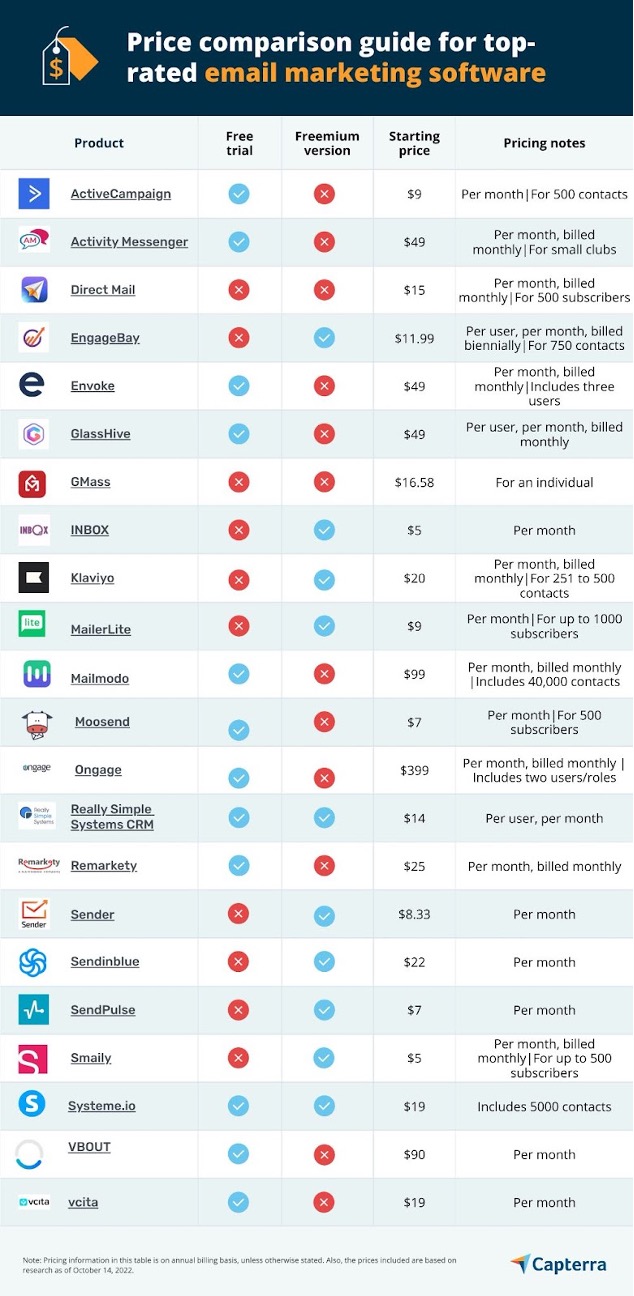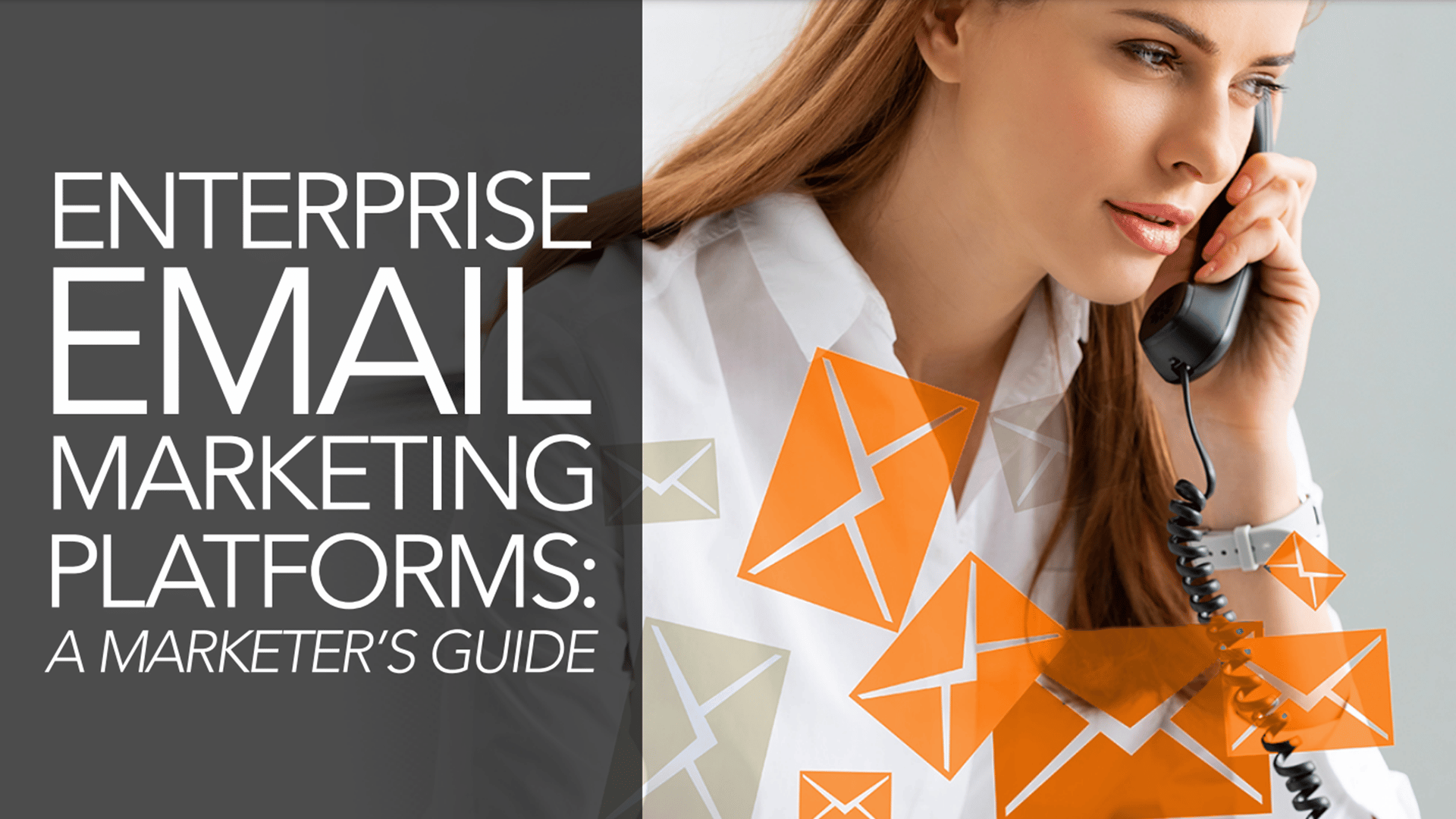Why do over 85% of businesses across the globe prefer email marketing as a primary outreach channel? The reason may be associated with its high ROI of 4200%, where every $1 spent could potentially return $42. Whether you are a freelancer, a startup, or a multinational corporation, choosing the right email marketing platform is undoubtedly a game-changer.
The world of email marketing platforms has significantly evolved with time. Initially used as a basic communication tool, it has now become the nucleus around which businesses strategize their customer engagement activities. Interestingly, a NextRoll study reveals that email marketing can drive customer retention rates as high as 12% when compared to other channels. So, all that is needed for businesses to make waves is to make an informed choice of their email marketing platform.
Compare top email marketing platforms, like MailChimp, SendinBlue, and ConvertKit, by evaluating their features, pricing, user experience, automation capabilities, and integration aspects. This comprehensive guide assists businesses in choosing a suitable platform based on their specific needs and budget.

Delving into Top Email Marketing Platforms
Understanding and choosing among the leading email marketing platforms can be quite a task given the sheer number of solutions available. This detailed guide to comparing the top email marketing platforms aims to simplify your quest for the most suitable service for your business. We shall look at key features, cost, reliability, and other essential factors to help you make an informed decision.
Understanding Email Marketing Essentials
Email marketing still ranks among the most effective digital marketing strategies, reaching customers directly without being overly intrusive. The right email marketing platform can make this relatively cost-efficient method even more lucrative by automating messages, tracking results, and providing insights into user behavior.
Beyond sending out mass messages, contemporary platforms offer features like segmentation, personalization, and triggered messages. These make email communication more sophisticated and targeted, thereby increasing engagement and conversions.
It’s also essential to note that effective email marketing is more than just spamming inboxes. It requires understanding and abiding by certain business ethics and laws such as GDPR and CAN-SPAM, among others. Compliance features are therefore a crucial aspect to consider when comparing top email marketing platforms.
Last but not least, these platforms should ideally be easy-to-use and require minimal technical knowledge. From creating eye-catching templates to analyzing data, the platform chosen should save time and effort instead of adding more tasks to your to-do list.
MailChimp: An Extensive Tool
MailChimp is one of the market leaders, renowned for its user-friendly interface and extensive feature set. The platform offers everything from basic email marketing functionalities to advanced features like audience segmentation, comprehensive analytics, and A/B testing.
In terms of personalization, MailChimp takes the cake with its ‘merge tags’ feature that enables highly personalized emails. Moreover, its recent integrations extend its capabilities to landing page creation, social media advertising, and even setting up an online store.
However, it’s worth mentioning that MailChimp’s advanced features come at a relatively steep price compared to some other top email marketing platforms. Small businesses and startups on a tight budget might therefore find it less appealing.
SendinBlue: A Budget-friendly Option
SendinBlue is a robust yet budget-friendly email marketing solution admired for its range of features offered at friendly prices. Of note is its easy-to-use email editor, A/B testing feature, and comprehensive reports.
One of SendinBlue’s standout features is its SMS marketing functionality – a rare addition among email marketing platforms. It’s also highly lauded for its transactional email service and the ability to scale up as your business grows, without worrying about spiked costs.
While SendinBlue performs exceptionally well in most areas, it falls a little short in terms of third-party integrations. Although it integrates with major services like WordPress and Shopify, you might come across a few missing ones if you’re using less popular platforms.
Beyond the Basics: Unveiling Advanced Features
Comparing the top email marketing platforms would be incomplete if we didn’t delve into their advanced features. These functionalities, which often distinguish great from good platforms, include automation, sophisticated analytics, eCommerce capabilities, and integration with other marketing tools. Here, we shall hold MailChimp, SendinBlue, and a few other leading platforms under the scanner to interpret their broader offerings.
Automation Capabilities: Nifty Tools for Efficiency
Email marketing automation tools can be a real game-changer for businesses, saving time and advancing accuracy. Several top platforms offer automation features like autoresponders, drip campaigns, and customer journey mapping.
MailChimp offers one of the finest automation suites with features like product recommendation emails, abandoned cart messages, and order notifications. On the other hand, SendinBlue’s automation features are a bit more basic but get the job done effectively. The platform also offers SMS marketing automation, setting it apart from many competitors.
Also noteworthy is Omniscience’s Engage, a dedicated email automation platform. With predictive analytics and personalization at its core, Engage consistently engages customers via email and other communication modes throughout their lifecycle.
ActiveCampaign is another top player offering advanced automation features. It goes the extra mile by allowing you to segment triggers and actions to create intricate, multi-stage campaigns without the need for coding skills.
Dynamic Content & Segmentation: Perfecting Personalization
Personalization is key to standing out in choked inboxes and enhancing customer engagement. Platforms offer varying degrees of customization and segmentation capabilities to achieve this objective.
MailChimp offers comprehensive segmentation options, with over 100 pre-built segments and the option to create custom ones based on nearly any subscriber data. Similarly, CM Group’s Campaign Monitor provides dynamic content insertion based on audience segmentation for personalized emails.
ActiveCampaign goes a step further with machine learning to create predictive content. It also allows users to segment their audience based on behaviour, demographics and social data. This takes personalization to a whole new level, leaving a lasting impression on recipients.
For businesses comparing top email marketing platforms, it’s vital to look beyond just the basics. The ability to scale up, advanced customization, integration, and personalization capabilities are crucial considerations. Remember that the best platform for you will primarily depend on your specific needs and objectives. So define these clearly before committing to any particular one.Best Email Marketing \u0026 Automation Software in 2023!
Guide to the Leading Email Marketing Platforms
Email marketing continues to serve as an effective digital marketing strategy. Let us evaluate some top players in this field.
| Platform | Key Features | Suitable For |
| MailChimp | Advanced analytics, Automation tools | Small to Medium Businesses |
| Constant Contact | Great user interface, Numerous templates | Newbies and Nonprofits |
| GetResponse | Landing pages, Webinar solution | SMBs and Big enterprises |
| Campaign Monitor | Great deliverability rates, Award winning support | All-sized businesses |

Frequently Asked Questions
Delving into the world of email marketing platforms can seem daunting. This FAQ simplifies this universe, comparing the top platforms to guide your choice.
1. Why is it crucial to compare the top Email Marketing platforms?
Email marketing, being a potent tool in your digital marketing suite, warrants a platform that optimally suits your business needs. The market is crowded with numerous platforms, each with unique features and pricing plans.
Choosing the appropriate platform without proper comparison can invite unnecessary expense and ineffective results. Therefore, comparing platforms provides clarity, ensures the best-fitting decision, and yields better ROI on your email marketing investment.
2. What factors should be considered while comparing Email Marketing platforms?
The platforms vary in several aspects, thus a careful consideration is needed. Key deciding factors include: interface ease-of-use, the customization level of email templates, the automation quality, segmentation capabilities, reporting and analytics options, and, of course, the pricing structure.
Other add-on features such as CRM integration capability, A/B testing, deliverability rates, customer support quality, and the availability of native apps for mobile platforms also weigh significantly in the comparison process.
3. How do top Email Marketing platforms differ in pricing?
Pricing structures are diverse among the top email marketing platforms. Some platforms follow a subscriber-based pricing model, where costs scale as your subscriber count increases. Others operate on a ‘pay-per-use’ structure, charging based on the number of emails sent, not the subscriber count.
Additional pricing dimensions may include scalability features and add-on services. It’s essential to thoroughly understand each platform’s pricing scheme and compare it to your business needs and budget to find the right fit.
4. Why is the user interface crucial in Email Marketing platforms?
The user interface (UI) plays a significant role in the manageability and utility of an email marketing platform. A clean, intuitive UI ensures smooth navigation, campaign setup, customization, testing, and analysis without steep learning curves.
On the contrary, a complex UI can impede operations and reduce efficacy, despite the platform’s solid features and capabilities. Therefore, comparing UI designs among top platforms ties back to your team’s comfort and productivity levels in the long run.
5. Are integrations important in the comparison of Email Marketing platforms?
Integrations can significantly boost your email marketing efforts. A platform that seamlessly integrates with your existing systems (CRM, E-commerce, social platforms, etc.) contributes to smoother workflows, enhanced targeting, and richer data analysis.
Platforms differ in integration capabilities, with some offering broad options while others limit to specific integrations. Therefore, comparing the compatibility of each platform with your business tool ecosystem should be a crucial part of your decision-making process.
5 BEST Email Marketing Platforms in 2023
Through this comprehensive guide, we have compared various top-notch email marketing platforms. Their respective features, pricing, pros, and cons have been evaluated, providing a clear idea to choose the best software that fits your business needs. The importance of a good email marketing platform can’t be underestimated as it plays a pivotal role in reaching out to the customers and enhancing the overall impact of your digital marketing.
As we’ve highlighted, each platform has its own strengths and weaknesses. Picking the right one depends on what you value most – whether that be advanced analytics, user-friendly interfaces, or extensive customization options. Take the time to consider your specific needs carefully and find the solution that best fits your strategy. Remember, an effective email marketing system should serve as a substantial support for your business growth.